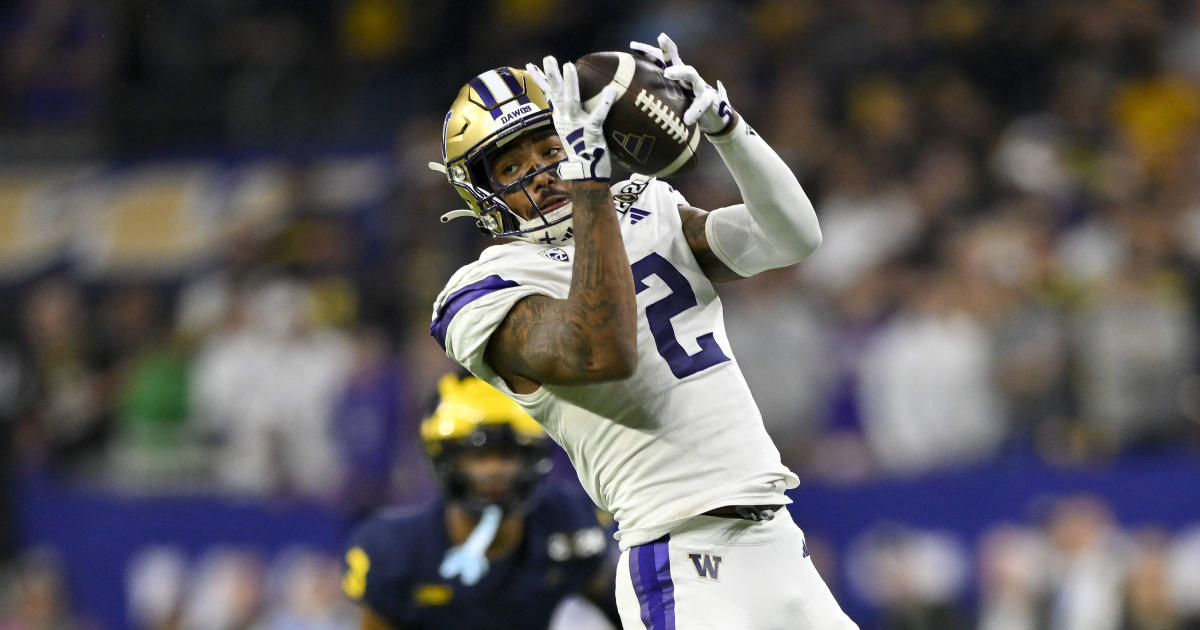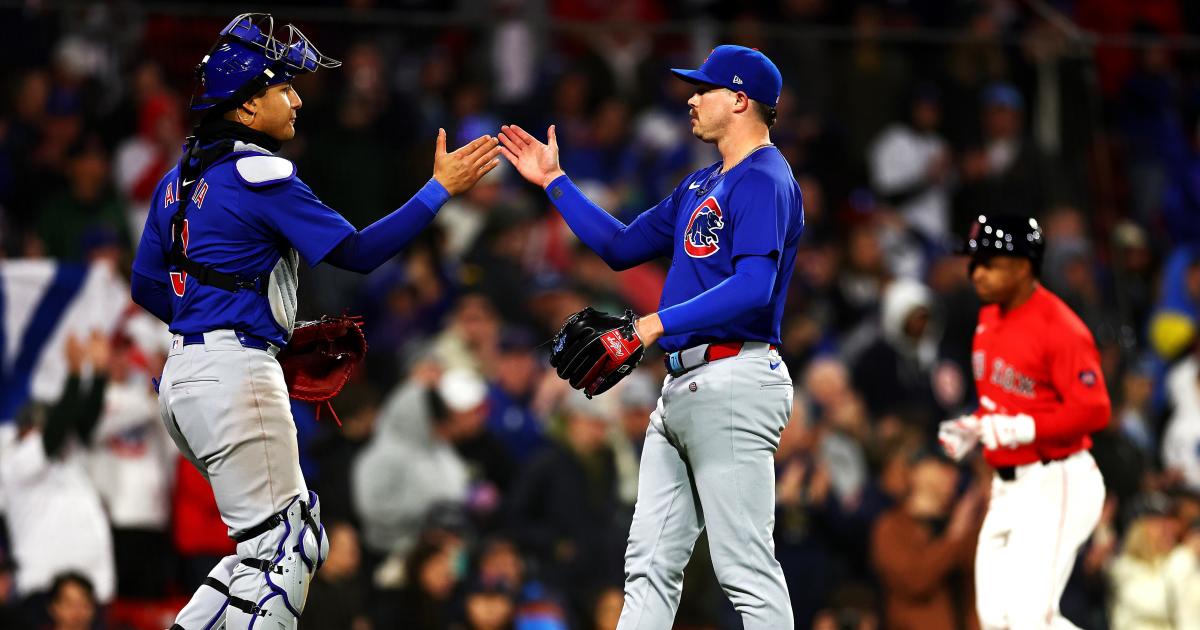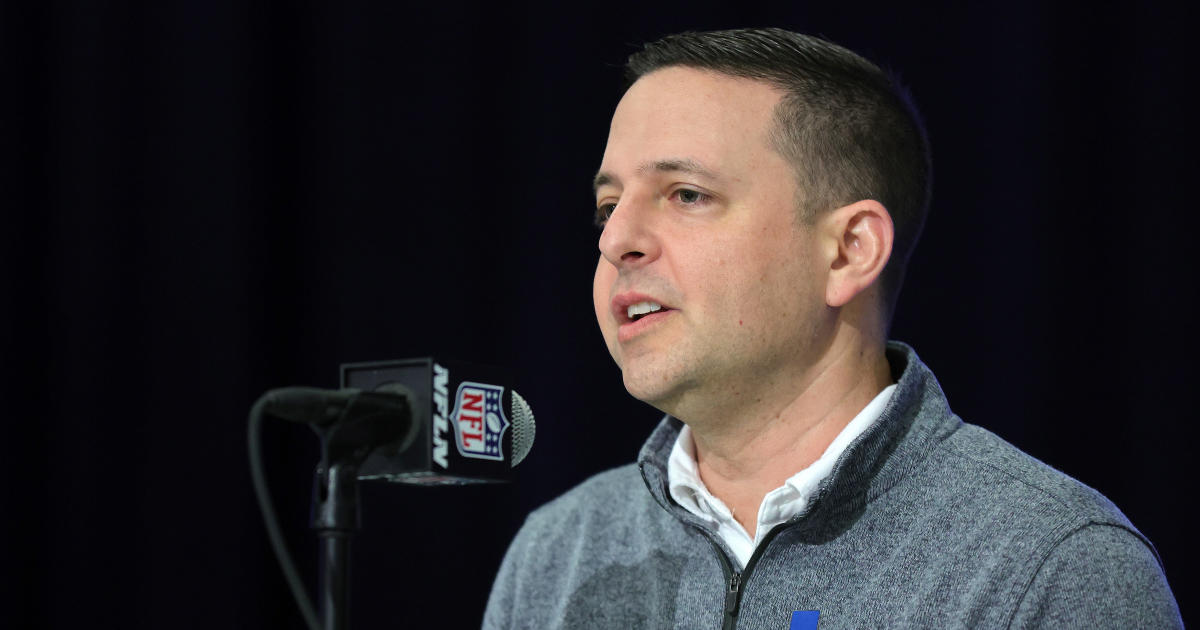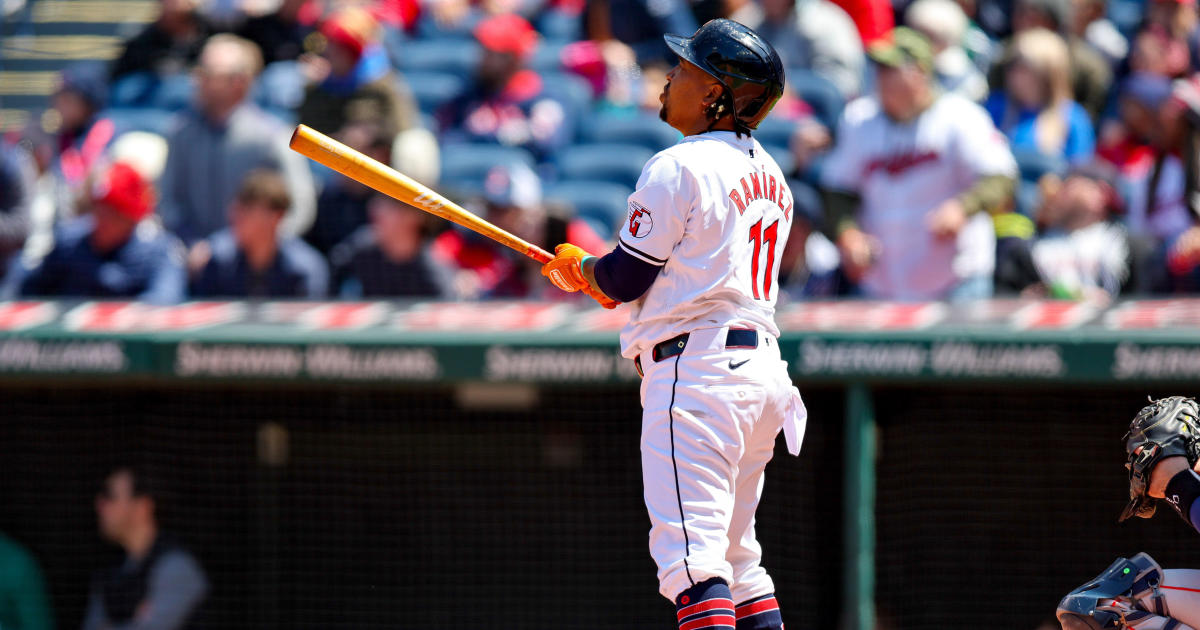"The Dynasty" episode review: Matt Cassel season and Aaron Hernandez saga
BOSTON -- Another week, another pair of episodes of "The Dynasty" hitting the stream on Apple TV+. This week, though, the fun unmistakably ends.
The fifth episode focuses on Tom Brady's torn knee in 2008 and Matt Cassel's work filling in for Brady before briefly touching on the disappointing 2009 season. Then the sixth episode rolls right into the drafting of Aaron Hernandez, detailing his three-year Patriots career and his arrest for murder. It's undoubtedly a significant stain on the Patriots organization, and impressively, owner Robert Kraft doesn't dodge that reality in any way during his interview.
"We messed up in this one," a contrite Kraft said at the end of the episode.
Here's the review of both the fifth and sixth episode of "The Dynasty."
"The Dynasty" Episode 5: "Torn"
--If you ever used to think the 16-0 banner looked incongruous amid actual championship banners that hang at Gillette Stadium, then you can now know that its existence seemingly got the approval of Bill Belichick. Despite the fact that the 2007 near-perfect season ended in absolute heartbreak, Belichick urged his team in 2008 to remember the 2007 season fondly.
"You know, I think back to last season, I know that you've heard me say, 'Last year doesn't mean anything, we don't care about last year.' But I hope that you will never forget those 16 wins," Belichick said at a team meeting during 2008 training camp." You know, I've been through 5-11, I've been through 7-9. Those are the seasons you wanna forget. Believe me. Not the 16-0 ones."
The 16-0 banner was taken down in 2015, after the team had finally won another Super Bowl. But it flew for seven years, serving as a constant reminder of either the most painful loss in franchise history or a magnificent regular-season achievement, depending on one's perspective.
--Tom Brady got choked up while addressing the team before the 2008 season. "Can I say something? As I reflect back on last season, we didn't finish the way we wanted. But we know what we shared. I hope we learn from it, and I hope we take it forward," Brady told the team during that same training camp session. "I always get emotional, so ... just thinking about things I really care about. So, thank you."
Interestingly, the videos playing during that meeting appeared to have been highlights from the 2007 season. It looks like the 2008 team was eager to not ignore the previous season at all.
--Tom Brady wanted to play the rest of the 2008 season on his torn ACL. He figured he could tough it out and undergo the surgery after the season. As Brady recalls, "I went into Coach Belichick's office and said I want to play. I'll fix my ACL at the end of the year. I could just put a brace on it, I'll tape it and I'll just play the whole season." Randy Moss remembers seeing Brady trying to throw after the injury, too, saying, "It was hard for him to accept." The man is insane. You knew this already, but still.
--The single funniest moment of the episode came from some locker room footage after the Patriots eked out a victory in Week 1 of the 2008 season, with Matt Cassel stepping in for the injured Brady. Belichick addressed the team and said that in 1999, Trent Green got injured, and Kurt Warner led the Rams to a Super Bowl. He then reminded everyone that in 2001, Drew Bledsoe got hurt, and Brady led the Patriots to a Super Bowl. Belichick then said, "If that's the way it's gonna be, Cassel, then we're riding your shoulders. So get ready."
The camera then panned to Cassel, who looked absolutely shell-shocked in that moment. Cassel wore a face that said, "Sir, pardon me, but did you just say SUPER BOWL?"
--The next week, after the Patriots beat the Jets in New Jersey, Belichick presented the game ball to Cassel by saying, "Cassel, I know you haven't started a game since the f------ seventh grade. But you started one today." We know that it was actually his senior year of high school some eight years prior to that day. Which is pretty nuts.
--More from Brady: "Three days after the surgery, I was trying to pretend like I was superhuman." His father then explained that the infection Brady endured was a result of ... Brady pushing himself too hard after the surgery. "I lost a lot of weight. I was very gray. I couldn't sleep, I couldn't -- I just couldn't move my knee, it was so swollen. It was really tough, but I had great people there for me."
--Enter: Alex Guerrero. Brady's personal guru makes his dramatic entrance right on cue after that comment. While dedicating an entire episode to the 2008 season was a bit much, it was a significant year because it marked the point when Brady dedicated himself to remaining healthy enough to play for a long, long time after the injury. Guerrero obviously helped him on that journey. As Brady put it, he was looking to answer the question of, "How do I not break?"
Considering the man played an absurd 253 games and won four Super Bowls without missing a single game due to injury after that 2008 season, it's safe to say he found the answer.
--The episode provided a brief recap of Belichick's upbringing under his father, a coach and scout for the Naval Academy, which accounts for Belichick's militaristic approach to running a football team. Cameras also caught this speech from Belichick during a meeting: "We have one sign around here, right down here on the hall on the way to this meeting room from a guy named Sun Tzu. It's his quote: Every battle is won before it is fought. Now look, I'm not saying we're in a war here, but I'm just telling ya, understand how one stupid play, one stupid penalty, one mistake ends it for all of us."
--Matt Cassel shared a great story about Belichick's coaching. He has told this one before, but it's still good: "One time, I don't see a corner blitz, and I get absolutely annihilated, like boom! Belichick comes in and he says, 'Cassel, can we figure out the corner blitz? Because I don't want to have to write your mother a letter that says, 'Dear Mrs. Cassel, we're sorry to inform you that your son is dead because he's a dumbass and didn't see the corner blitz.'"
--Unfortunately for Stephen A. Smith, this comment from him made the episode: "Bill Belichick to me is so great that he has me wondering about the greatness of Tom Brady. You're 11-5 with Matt Cassel in his first year quarterbacking this team. I got to the point where I've asked myself who's not gonna look like that playing under Bill Belichick?"
We learned years later that Cam Newton, Brian Hoyer, Jarrett Stidham, Mac Jones and Bailey Zappe did not, in fact, look like that playing under Belichick. Meanwhile, the greatness of Tom Brady reached unimagined levels after 2008.
But hey, in the hot take industry, you win some, you lose some, and then you move on.
--The second episode of this series features what I believe to have been fake sports radio calls, recorded for this show to stand in for sports radio calls from the early 2000s. This fifth episode appears to have taken a Bleacher Report article and laid it out as if it had been printed in newspaper. The story, written in 2009 by Andrew Nuschler for Bleacher Report, is displayed as a newspaper article with the headline, "Matt Cassel Proves that Tom Brady Is a System Quarterback." It appears on the newspaper page underneath a Bruins-Blackhawks recap from Jan. 28, 2002. (Bill Guerin scored with 21.1 seconds left to give the B's a 2-1 win.)
It's fair to surmise that the filmmakers used that newspaper image for one of the episodes about the 2001 Patriots en route to winning Super Bowl XXXVI, given the timing of that Bruins recap. The purpose would presumably be to add more heft to the hot take, because the barrier for getting a column printed in a newspaper in 2008 was much higher than it was to have a story published on Bleacher Report. (The odd capitalization rules in play were a giveaway, as "The Dynasty" added the word "that" without a capital T to the headline.)
If they faked a newspaper article ... they're not really making a documentary. And without explicitly stating that some elements from the media have been either created out of thin air or repurposed in different formats, it comes across as an effort to dupe the viewer. It also feels unnecessary, as the announcement of the series bragged that the filmmakers pored through over 40,000 hours of archival footage. There doesn't seem to be a need to create media -- audio, newspaper, tape-smashing cleanup, etc. -- that didn't exist.
Fortunately, this is a football documentary, not an actually important documentary. But still, standards should apply.
--This episode included clips of Tom Brady working out in his Brookline backyard, footage shot in 2017 for his "Tom Vs. Time" docuseries. Those clips were used to illustrate Brady talking about what his mindset was entering the 2009 season, coming off the ACL injury. "The Dynasty" has done some time-jumping when trying to tell certain stories, which can create some uncertainty in viewers when trying to deduce if the footage on the screen matches the time period being discussed.
--After buzzing through the disappoingint 2009 season and the home playoff loss to the Ravens, the episode ends with a quote from Ernie Adams, setting up the Aaron Hernandez episode. "In the fourth round, we found this guy that we liked. There were some off-the-field issues. We thought there's a degree of risk here, but it makes sense to take him," Adams said. "But looking in hindsight, of course, we did not understand the full dimension of what the problem was."
"The Dynasty" Episode 6: "At All Costs"
--The Aaron Hernandez episode is, quite simply, a haunting 34 minutes. And that begins right from the jump. The episode opens with footage of Hernandez in front of a green screen, seemingly filming a video to appear in the stadium or on a national broadcast for player introductions. Taking instruction from someone off-screen, Hernandez steps toward the camera, folds his arms, and stares into the lens for a dozen long, silent seconds. Hernandez then did a second take with a wide smile and a few chuckles, again holding the pose and staring into the camera for another 12 seconds.
Staring into the eyes of a deceased convicted murderer is how this episode begins, setting a heavy tone for the remainder of the installment.
--Deion Branch, who returned to the Patriots during Hernandez's rookie season in 2010 and played for the team in 2011 and 2012, appears to be the teammate most affected by Hernandez. Now 44 years old, Branch was visibly distraught during his interview while talking about his former friend.
"I hope people don't take this the wrong way," he said slowly. "Um ... you only know what someone is to their core, and you can only judge them by what you see. I have some moments where I'm just like, 'Like, you should have seen that.' Like ... 'Deion, you should have seen that.'"
--Ernie Adams discussed the debate the Patriots' front office had when selecting Hernandez in the fourth round despite the "off-the-field issues" at the University of Florida: "We knew that there were issues. But you make a calculation on draft day: Look, we're getting first-round talent for a fourth-round price. If it doesn't work out, right, we can always cut him."
--Some chilling footage from the 2010 NFL rookie symposium is shown in the episode. In it, Hall of Famer Cris Carter is speaking to the rookie class at a resort in California. Carter warned the rookies, saying that having money won't make them better people, and that it will only make them lean into their vices harder. Carter told the rookies that Buddy Ryan cut him from the team in Philadelphia, saying he wasn't a dependable player and that he had to "get smart."
Carter then takes questions from the group, and Hernandez stands with a microphone in his hand: "I was just wondering, what changes did you make from when you got cut to when you went to Minnesota?"
Carter replied: "Aw, you need to get yourself together, man. You need to stop lying to yourself. I stopped smoking that dope, stopped doing all those things I was doing, and I started getting my body in shape, and I started being able to run all day. And I told my old friends, 'Don't call me.' Now, this should be the fork in the road for a lot of you men to get y'all stuff together, before you get popped. Because you're gonna get caught. You're gonna get caught."
Hernandez appeared to be absorbing the answer in the moment, but we obviously know that he was never quite able to get away from the people he associated with in his home state of Connecticut.
--Josh McDaniels: "He had so much confidence that he thought every play should be drawn up for him."
--Receiver Brandon Lloyd, who joined the Patriots in 2012, said he got the sense that there was something off about Hernandez and that seemingly everyone in Foxboro was aware. "I quickly realized that something was going on," Lloyd said. "There was this troubling undercurrent. During training camp, Wes Welker makes this beeline over to me, and like grabs me by the shoulders, and he says, 'Brandon, your locker is in between Gronk and Aaron Hernandez. Now Aaron, he's gonna fondle his genitalia in front of you, he's gonna talk about bathing with his mom. You just gotta ignore it. You gotta ignore it.' It was like Wes has seen a ghost the way he was looking at me."
Lloyd added: "What Aaron was saying, it deviated far off the norm of just locker room bulls----ing around. He would rage out on players, motherf----n' people, saying he's gonna beat their ass, 'F---in, I'll kill you,' which is something that I don't take lightly. When Aaron would have meltdowns, Deion could come over and have a quiet conversation with him."
Branch then explained: "I probably had the closest relationship with Aaron. He and I was neighbors, he lived right across the street from me. His lady used to come over and help with the kids. Any time Aaron was boiling, Coach would always ask me, 'Is everything good, is everything good, is everything good?' It was like, check with Deion."
Branch would say that he and the team largely had Hernandez under control on the field. "Off the field is something totally different," he said. "Totally different."
--Lloyd and Welker said that Belichick would often let it slide whenever Hernandez had emotional outbursts on the practice field. "I remember one time in practice, we're doing punt return, we're catching balls," Welker recalled. "And Aaron was sitting there [saying], 'I'm the best returner on this team. Bill, why am I not back here?' Like literally a rookie sitting there talking like this, and Bill's like laughing. And like … I'm like, 'Why's he love this guy? I don't get it. I don't get it. ' But when you're that talented, a lot of people will put up with a lot of stuff."
Lloyd later added: "All the warnings were, 'Do not hang out with [Hernandez's nickname] Chico. Do not. Hang out. With Chico.' That was the code. For your own safety, do not hang out with Aaron.' So something was known."
--Robert Kraft, to Bill Belichick, before a training camp practice in 2012, after Hernandez had signed a $40 million extension: "I was most impressed with Hernandez, how he came in today. I think he's got such a good heart. He's a good guy. He told me he had to be careful with the people around him now. He recognizes it himself. He's come into so much money."
The Patriots' owner doesn't shy away from his misjudgment on Hernandez. In an interview for the documentary, Kraft said: "Aaron and I, we had a genuine feeling of connection -- and love. Every time he'd see me, he would kiss me on the cheek. I mean, this is something I do with my sons. I think he viewed me, you know, sort of as a loving paternal figure. I remember when my sweet wife, Myra, passed away of ovarian cancer, Aaron handed me a check for $50,000 to the fund that we had set up in memory of Myra. I said Aaron, this is very sweet, you don't need to do this, you've already got your contract. And he started getting tears in his eyes. 'No,' he said, 'no, this is very important to me. I want to do it for you.' It really touched me. I felt he was what we wanted as the perfect Patriot player."
A year later, when Hernandez became a suspect in the Odin Lloyd murder, Kraft told Hernandez to tell him if he did it.
"I said, 'Aaron, tell me, did you do this. Because if you did, I know you must have had some good reason. I'm gonna get you the best defense lawyer we can get, and I'll do it at my cost,'" Kraft recalled. "And he looked me right in the eye, not blinking or anything, and said, 'Mr. Kraft, I didn't do that. I was in Rhode Island.' Or something. And when he said it, I believed him. He actually changed my life and how I look at people, because it just -- I, to this day, I can't believe I got snookered like that."
--Notably, Tom Brady did not appear at all in this episode, aside from old footage from practice and games. Bill Belichick appeared very briefly, only saying, "Yeah, it's an unfortunate situation about Aaron. And I don't have anything to add to it."
That was Belichick's answer when asked how he responded to Hernandez's request to be traded to the West Coast in February 2013. Ernie Adams said that things could have been different if Hernandez never ended up re-signing in New England: "Probably the best thing for Aaron Hernandez's pro football career and his life might've been to go to the Seattle Seahawks, not be within a two-hour drive of people he grew up with from his hometown of Bristol. You know, someone got killed. A young person lost his life because of Aaron Hernandez."
--Jonathan Kraft said Robert Kraft and Belichick were both out of the country when Hernandez was arrested at his home, so he had to quickly make the push to release Hernandez from the team.
"He didn't want to have to lose an amazing football player," Jonathan Kraft said of Belichick's response. "So Bill's instinct would be play this f---ing thing out 'till the end. And I just knew we couldn't play it out till the end. Not because of how it looked on us, but because we had to set a fu----- example. I mean like, it's like, this guy's a murderer!"
--Robert Kraft ended the episode: "When we bought the team, I said that we could make a difference in our community and make things better. We didn't in this case. There are parents who wake up every day without their sons, and a young daughter without her father. We messed up in this one. And for those of you who feel pain, I apologize."
Reviews for episodes 1 and 2, as well as episodes 3 and 4, are also available.



